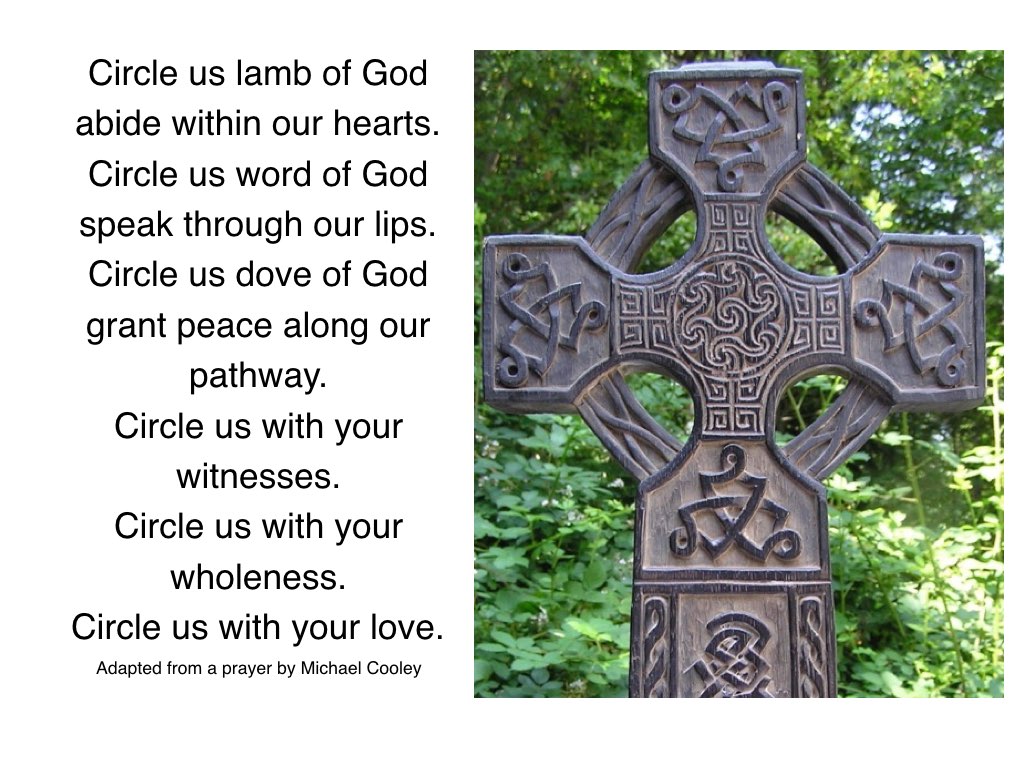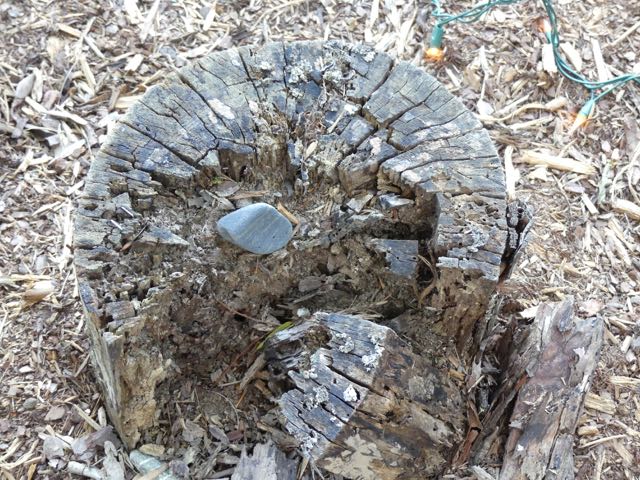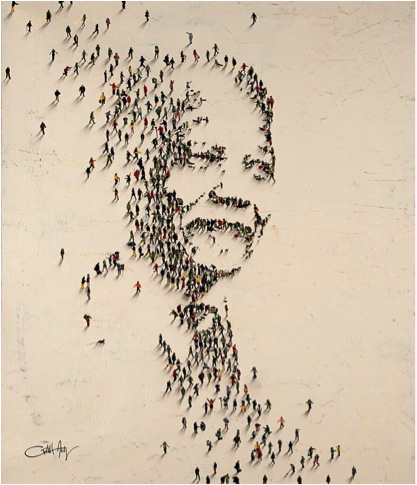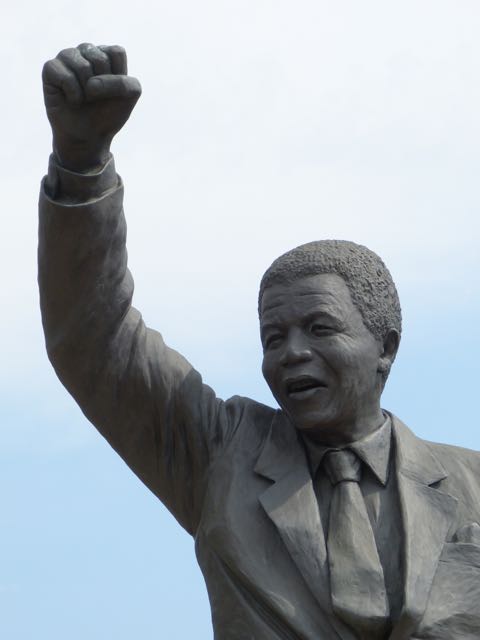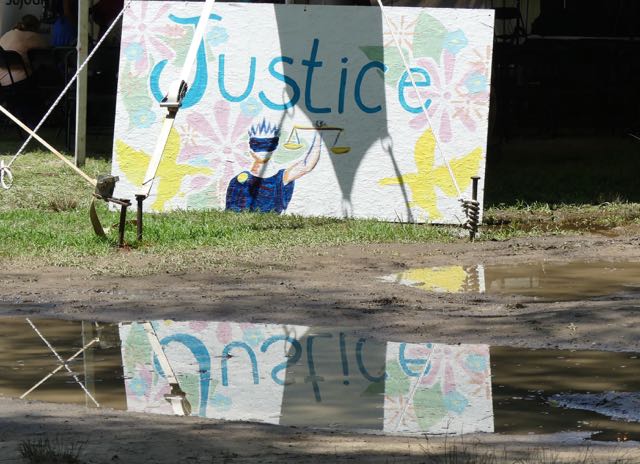Circles were significant to the Celts. It was felt that a circle with no break was a symbol of eternal life, a complete whole affording no access to the devil. It was a symbol of unity, togetherness and purity.
Celtic crosses are unique in that they incorporated the circle at their heart. Some have suggested that this circle depicts the wreath given to military heroes in Rome showing Christ’s victory over the forces of evil. Others see it as a halo representing the holiness of the one who died there. The circle was a pagan sign depicting the sun or the earth, the natural world. By superimposing the sign on the cross, the Celts expressed their view that the revelation of God comes to us through the natural world and in the person of Jesus Christ. We need both to get the full picture, so the two are bound together with the circle at the intersection of the natural and the spiritual realms (Rodney Newman, 70).
It is for these reasons that we have chosen the circle as the central symbol for our Celtic retreat. We come to create a circle of unity, togetherness and wholeness with God’s creation and with all the peoples of our world past, present and future.
What is Your Response?
Let us sit with our eyes closed for a few minutes and imagine the circle of God’s presence surrounding the creation around us. Extend the forefinger of your right hand and draw an imaginary circle around the place in which you sit. Imagine Christ standing at the centre his arms outstretched as on the Cross, binding together the elements of the natural world and the built world of your city or dwelling, into a sacred circle of wholeness. What stirs in your mind as you do this?
Now open your eyes and draw a circle in your journal that represents the encircling presence of God. Write or draw the images that came to your mind. What is embraced by the circle of God’s wholeness for you? What is still broken and stands outside that circle?
November 2nd is Looking for Circles day but it is a day we can celebrate at any time. Circles are everywhere. Our fingers and the rings that encircle them, the spiral patterns in leaves or a special rock, the wheels of cars, and, of course, the mysterious crop circles are a few examples. Some of the circles around us are perfect, some are in the form of spirals, some are broken. Yet in all the pattern is discernible.
God’s promise of wholeness and the completion of the healing both of creation and of all humankind that the circle represents, is hidden within all our hearts and within all of creation. We rejoice with God’s creation where the circle is ever present and yet often distorted, disfigured or scarred. We rejoice too with those who have borne witness to this dream of wholeness throughout the centuries, living their lives to bring healing, freedom and abundance to the oppressed, the hurting and the abandoned.
We think particularly of Nelson Mandela whose life we celebrate today. We think too of the Celtic saints who stand in the circle with us. They had a powerful sense of the unity of the whole created order and believed that God is always at work making all things whole. We continue to be inspired by their wonderful example.
What is Your Response?
Look around you. Take photos of or make a list of the circles you see. What thoughts and emotions do they invoke? A you do so, ponder the questions: Where do we feel surrounded by the circle of God’s love? Who stands with us in the circle? How is God’s creation bound with us within that circle?
Watch the video below CIRCLE ME By Jeff Johnson, sung here by tenor Ross Hauck. It is one of my favourite circling songs. Are there other images that come to mind as you watch the video? Add these to your circle in your journal. Now write your own simple circling prayer. Use the format: Circle me Lord Keep… out (your fears or concerns), Keep… in (your hopes and aspirations). You can write as many couplets as you like. Print out the prayer to use throughout the week.
Circle Me, O God – Jeff Johnson from Music@BelPres on Vimeo.
“He was born Rolihlahla, “Shaker of Trees.” He became Nelson Mandela and shook the world.” ~from The Long Walk of Nelson Mandela
Several years ago I watched a documentary on the Apartheid in South Africa during Denver’s Film Festival. I have spent time in South Africa and love the country. I have seen Mandela’s cell in the prison on Robben Island. I have been to Soweto and the museum in Johannesburg and listened to the stories. Though the film revisited many of these places, I actually recall very little of it except for the story of one man. He had a position in the South African government that supported and benefitted from the apartheid, the system of legislation that enforced severe racial segregation. He was also a Christian.
What I do remember of the film was his ache. “I didn’t see, I didn’t see,” he cried. Tears of repentance and lament dimmed his eyes as he described his awakening to the suffering and humiliation imposed on black South Africans by the privileged white regime. His lament is one that I hope and pray will be the cry of many white Americans as we slowly awaken to the reality of the experience of black people in America.
We simply don’t see. It is extremely difficult for white American Christians in particular to recognize our racism. We don’t like this word. We react to this word. But to move towards healing, we need to face this word. It’s not that most of us would ever wish misfortune upon a person of color, nor would many of us knowingly treat a person of a different race insensitively. Most of us just go about our lives, trying to be nice. And comfortable. And happy.
We simply don’t see.
We have a built in defense against seeing our complicity in the painful realities of the lives of those who are not white in America. We have created a church culture in which any sense of darkness, failure or just plain selfishness in ourselves is too shameful to admit. We have learned to cast the yuckiest parts of ourselves into shadow so we can present what is manageable and attractive. It is not uncommon to hear people talking about “what the Lord has been working on in me.” But it’s rare to hear the real humility of simple honesty: I am both saint and sinner, glorious and grotesque. And sometimes I’m just a jerk. I’m afraid. I get nervous when walking past a black man I don’t know. I assume that if a cop shoots a black man then he must have been guilty. “They” struggle because “they” don’t work hard enough. We don’t admit these things out loud very often. We are too practiced at presenting ourselves to be better than we actually are, and so we are not transformed in the deep places.
We don’t understand what life is like living in a black body in this nation. We simply can’t understand why “they” can’t just be like “us.” We don’t understand systemic injustices. We don’t realize that we judge others’ experiences and complaints and sufferings through the lens of our own lives and opportunities and presumptions. We don’t see that white lives are very privileged, which means that everything is tilted in our favor. We rarely meaningfully interact with people who struggle to survive underneath our society’s oppressive heel. We don’t see that we all have an innate suspicion of the other. We simply don’t see that we are deeply racist because we are deeply human.
It will be costly to learn to see through the eyes of the other. But it doesn’t start with scolding. It starts with love. Our faith brings us face to face with the gaze of Love. Most often we turn from its penetrating brightness. But once the light of that love has illuminated our hearts, we can begin to see others with new compassion. We can see ourselves with that compassion too, and be less fearful of seeing the ugly things we haven’t wanted to see. Encountering this Love is way of healing. It lifts the logs from our eyes and we see anew. It is the way of Christ.
Nelson Mandela knew such love. He was imprisoned for 27 years for opposing a regime whose apartheid laws constitutionally entrenched the humiliation and condition of de facto slavery for South African blacks. He was considered a terrorist. However, he spent his imprisonment learning Afrikaans, the language of his white captors and over time he won their respect. He read their books, and their poetry. He knew their souls. He created relationships through which he entreated the prison guards to treat him as a fellow man – one with human dignity. When he was released he treated everyone, including his former enemies, with the same respect and dignity that he had engendered for himself. He had fought white domination and therefore refused to allow black domination. He was a master reconciler; he persuaded a whole people, in this case the most racially divided people on Earth, to change their minds towards one another.
After Mandela’s release and the dismantling of apartheid law, the ANC (African National Congress) party was certain to win the first democratic election in South Africa in 1994. Nelson Mandela would become the President of South Africa. The party faced the small problem of deciding what would be the new national anthem for an essentially new nation. The old anthem celebrated the advance of white colonizers as they crushed black resistance. The unofficial anthem of black South Africans was a soulful, heartfelt tune about their longsuffering. It was gleefully clear to the new committee that the official white anthem was out. Mandela responded however, “This song that you treat so easily holds the emotions of many people who you don’t represent yet. With the stroke of a pen, you would take a decision to destroy the very – the only – basis that we are building upon: reconciliation.” He had spent 27 years getting to know the heart of those who had been his enemies. He taught that you win over people by respecting their symbols and all that is deeply meaningful to them saying, “You don’t address their brains, you address their hearts.” Eventually they pulled together two anthems in five languages into one united song.
And slowly, gently, hearts were changed, like that of the weeping Christian man in the documentary. “I was blind and now I see,” he cried. Hearts were transformed because someone listened, learned, and opened himself to the other. Mandela refused to ever compromise on the dignity of the human person no matter what color, political stance or religion. Some in the former apartheid regime feared a reverse apartheid. Instead, Mandela learned their stories, he listened to their souls, and he honored their lives. He crossed over into the reality of the other. And a nation healed.
May it be so for us, America. We have been graced with the light of God’s love and the hard won wisdom of this teacher who helps to illuminate our darkened path.
The Light shines in the darkness and the darkness has not overcome it. (JN. 1:5)
“I once asked Archbishop Desmond Tutu, a Nobel peace prize winner like Mandela, and one of the people who knew him most intimately, if he could define Mandela’s greatest quality. Tutu thought for a moment and then – triumphantly – uttered one word: magnanimity. “Yes,” he repeated, more solemnly the second time, almost in a whisper. “Magnanimity!”
There is no better word to define Mandela. No leader more big-hearted, more regal, more generously wise. Not now and, quite possibly, not ever.” ~John Carlin
Mandela was a reader. Some books that help with learning and listening include: Disunity in Christ by Christena Cleveland, Divided by Faith by Emerson and Smith, The New Jim Crow by Michelle Alexander, Just Mercy by Bryan Stephenson, Between the World and Me by Ta-Nehisi Coates, and the many powerful novels by Toni Morrison.
(quotations included – by Nelson Mandela)
A boy runs under a sun made
for shining on every soul.
But Africa pulses under his feet
with rumbles of injustice.
He felt the tremor on the
day he awoke to discover
there was a colour code of race and culture
under South African skies.
“No one is born hating another person
because of the colour of his skin,
or his background,
or his religion.
People must learn to hate,
and if they can learn to hate,
they can be taught to love,
for love comes more naturally
to the human heart
than its opposite.”
Justice grew a fierce song
that could not rest in him –
to cry out over every mountain
and into the deepest valleys
of his nation, over stones
and rivers and across the ocean.
“For to be free is not merely
to cast off one’s chains,
but to live in a way
that respects and enhances
the freedom of others.”
A bird is made for freedom –
To fly is what comes naturally.
A human is made with blood –
That courses red through every vein.
A bird in a cage may be battered,
but 27 years in a cage will not
remove the knowledge of flight
that resides in every cell of his body.
Open the cage and he will show
every human being what it is
to be made equal, to have a voice,
to live with a heart beating in his chest
as every heart beats in every chest
across the nations of the world.
“As I walked out the door toward the gate
that would lead to my freedom,
I knew if I didn’t leave
my bitterness and hatred behind,
I’d still be in prison.”
“When I walked out of prison,
that was my mission,
to liberate the oppressed
and the oppressor both.”
“I always knew that deep down
in every human heart,
there was mercy and generosity.
Man’s goodness is a flame
that can be hidden
but never extinguished.”
In 1994 for the first time
human beings of every colour
made their mark of personal choice.
Mandela was elected president.
“It always seems impossible
until it’s done.”
———————————————————
In 1990, Nelson Mandela was released from 27 years in prison and worked together with F.W. de Klerk to end apartheid. Three years later they were jointly awarded the Nobel Peace Prize. By 1994, for the first time in South Africa, democratic elections took place and Nelson Mandela was elected president by the overwhelming majority.
Nelson Mandela (18 July 1918 – 5 December 2013) pointed to a supernatural reconciliation that is only possible through mercy and forgiveness. This is the greater way we have been shown by Jesus on the cross.
The blood sacrifice
on the hill of Golgotha
of the one and only
Son of the Living God,
has torn asunder for all time
the curtain of division.
We remember today
what it is to listen
to the prayers of Jesus.
To be one as he is One
To forgive as he forgives
To be healed as he is whole
To be one as he is One.
Amen.
As you listen to “Nelson” – A Tribute to Nelson Mandela by Greg Engle, may you be encouraged in the mercy of our Living God who is the God of impossible possibilities.
by Rowan Wyatt
Today’s post is written to commemorate Nelson Mandela Day July 18th
Matthew 5:43-48 (ESV)
43 “You have heard that it was said, ‘You shall love your neighbor and hate your enemy.’ 44 But I say to you, love your enemies and pray for those who persecute you, 45 so that you may be sons of your Father who is in heaven. For he makes his sun rise on the evil and on the good, and sends rain on the just and on the unjust. 46 For if you love those who love you, what reward do you have? Do not even the tax collectors do the same? 47 And if you greet only your brothers, what more are you doing than others? Do not even the Gentiles do the same? 48 You therefore must be perfect, as your heavenly Father is perfect”.
Half of my family is Welsh, as I am, hailing from Llanelli but the other half is from South Africa, Bloemfontein, so we were or should have been, a multi-cultural family with the kind of diversity that would fit in to cosmopolitan London. But no such luck, this was the 1970’s.
I grew up in a time and place where racism was rife and really part of the norm. Gangs of skinheads roamed the area and would frequently attack groups of blacks and Asians, their community centres and stores, violence was rife and if you were not part of it then you were the outsider. My family were racists, my dad was apartheid South African and my brother was a member of the Nazi party in London and I was regularly thrashed for having black and Asian friends at school.
This is how I grew up, silently against racism, but society making me feel actually complicit in their prejudices. But a teacher when I was at secondary school helped me to realize myself a bit more. He taught me about Steve Biko, Robert Sobukwe and others including Nelson Mandela.
I was impassioned to hear about these brave men, freedom fighters to a cause that seemed to me impossible to ever succeed in, but of course I learned that for them not to succeed meant banning, imprisonment and in the case of Steve Biko, death. I wept at man’s inhumanity to man based on colour, nationality or religion, I was truly radicalized by these men and their struggles.
I formed a Free South Africa movement in school, we wrote letters to Mandela, I doubt any ever got through, we held protests on school grounds leading to detention, suspension and threats of expulsion, attacked by racist school mates and ribbed by racist teachers. But I learned it is important to stand for what is right and to never let injustice walk the streets and parade itself.
Nelson Mandela spent 27 years in prison having been imprisoned in 1962 for leading a sabotage campaign against the intrinsically racist South African apartheid regime. But in that time he didn’t back down from his beliefs or his passion for justice, nor his resolve to end apartheid. Eventually the west began to take more notice and as the years wore on more and more movements were created, pressurizing the South African government to release Mandela and end apartheid. In 1990 Mandela was released after international pressure and growing fears of a real racial war.
Mandela negotiated with the president, F.W. de Klerk which led to massive reforms and the end of apartheid, the first multi-racial elections and the premiership of Mandela.
Whilst before imprisonment Nelson Mandela was a radical revolutionary, originally committed to peaceful struggle, he eventually adopted more violent direct action. But it was his later humility and peaceful actions that garnered him such love and respect. Simple acts of reconciliation like presenting the Rugby world cup to Springbok captain Francois Pienaar.
He showed that acts of love, kindness, togetherness, inclusion and most of all forgiveness were able to change the face of the world. Those acts defeated and revolutionized one of the most brutal regimes on the planet at that time and moved from hating his enemy to loving them.
South Africa still had its troubles, the far right still hated Mandela and the left thought he was too forgiving and inclusive, but he showed a middle way that was the right route, a straight road ahead.
Nelson Mandela died on December 5th 2013 from a respiratory infection and his funeral was attended by dignitaries and world leaders from around the globe as well as being televised worldwide, such was the global communities love and respect for the man. South Africa remains a pretty volatile place with racism from both colours still a problem but hopefully one-day can find a lasting peace.
As for me, Mandela helped shape me. But for him and other fighters against injustice I may have ended up a racist like many members of my family, thankfully I never did. Thank you Mr. Mandela.
by Fran Pratt
reposted from A Collection of Litanies from Fran Pratt
Oh God, our hearts are overwhelmed with sorrow for the endless trauma that continues to afflict the people of the earth.
Our hearts cry out.
We lament the violent tragedies that have occurred in recent days both at home and abroad.
Our hearts cry out.
We lift up our eyes to the hills;
Where will our help come from?
Our help comes from the Lord
Who made heaven and earth. (1)
Violence, murder, trauma, chaos – they seem to be unending and gaining momentum.
How long must we wait, Oh Lord?
Governments overrun, children and families killed, tension and fear rampant.
How long, Oh Lord?
We have nothing left but to hope in You, God
Our hope is in You.
Our grieved hearts have nowhere else to turn.
Come quickly to rescue us.
We pray for peace.
Yes.
We pray for violence to end.
Yes.
We pray for your merciful heart to beat inside us.
Yes.
We pray for you to show us how to help.
Yes.
We are pressed on every side,
but not crushed;
We are perplexed,
but not in despair;
We are persecuted,
but not abandoned;
We are struck down,
but not destroyed.
Death is at work in the world,
but life is at work in You.
Come now and bring life.
Our hope is in You.
Amen
- From Psalm 121
- From 2 Corinthians 4
Today’s post is especially written for World Day of International Justice – July 17
“It is reasonable that everyone who asks for justice should do justice.”
— Thomas Jefferson (1743–1826)
CHARLINE MUSANIWABO had a pretty ordinary life, a beloved member of a loving family, until the Rwandan genocide of 1994. She was eighteen and overnight her life plunged into an abyss. Both her parents, and five of her eight siblings, were killed. She fled with the remaining three, but was raped and forced to marry the Hutu rapist who had violated her, conceiving four children to him, suffering constant abuse to him over fifteen torturous years. With the help of a brave woman neighbour, she finally fled him in 2011. A longer version of her story can be read here.
Charline’s story echoes the fact that some injustices have been faced by relatively few. But her story also prompts us that injustice faces us all, not only in the wider world, but as much as anything, for many, within the sanctity of home. No greater oxymoron: violence done clandestinely within what should be the confines of the safest sanctuary.
Just how many women exemplify Charline’s story? How many even in ‘civilised’ countries with best practice legal systems? How many Charlines have we known? And what elements of her story resonate with our own stories?
The atrocities done to Charline are both rare yet contemptibly unremarkable; abhorrent, yet scarily real in the experience of many; too many, when even one case is unacceptable. Scarier still is the fact that we all have the perpetrator and victim in us.
Indeed, countless normal, indeed even gifted, people have instigated injustices. For instance, the biggest ecological disasters in the history of the world. In a former profession as a risk manager, I’d see the list of reported world incidents on a monthly basis, and it amazed me how the world coped with these gargantuan fires, dangerous chemical spills that would fill swimming pools, explosions that levelled entire towns, and toxic gas releases that could kill whole cities. Some of the worst disasters killed hundreds, if not thousands, of people.
In 1976, Bhopal in India was the site of the Union Carbide methyl isocyanate gas release that affected a half million people — and depending on who you read, somewhere between two thousand and sixteen thousand died! Innocent people who lived lives ignorant of the imminence of devastation. But the nuclear incidents are most disturbing. The Chernobyl reactor meltdown in 1986 is still a colossal problem thirty years hence, let alone within the tens of thousands of lives it wrought destruction, initially and subsequently. Then there’s the more recent Fukushima power plant disaster (2011), caused in some part by nature, but with the latent amoral precondition: a sequence to catastrophe at the mere presence of a nuclear power source. Where is the justice for the people killed or maimed by such events; or, those who lost dear ones? What technology should even be contemplated for use when a disaster from the use of that technology can wreak a several-thousand-year fallout? Of course, hindsight is a marvellous paradigm. If only the early governmental leaders had known what was ahead. Most concerning, though, there are many who would rise to power, and who have indeed risen to power, and who have deliberately abused God’s creation, procreating their egotism; a personal melting pot for national calamity. Yet we all have such capacity for wrongness.
We only truly understand justice
when we understand our limits
in procuring and executing justice.
***
Justice, the mystery.
***
Justice is God’s.
It is utterly inscrutable.
We can see it, even touch it, but we cannot control it.
Justice intends that we, the frustrated, come to the end of ourselves.
Then, to God we inevitably fall… and rest.
Then we’re measured; useful, finally, for both God and justice.
We all know that God’s earth needs her justice. We’ve all seen misguided people greedily step onto that idolatrous soapbox for their fifteen minutes of fame. We’ve lamented those who are trying to get ahead by ill-gotten gain. The ingredients of that person are latent within us, too. Justice warns us. We who have ears should listen.
Humanity shares something of a dichotomy with justice. We sense the need to act justly, to love mercy, and to walk humbly, but we struggle to practice it with consistency of purpose and end. We may be healed of our misunderstanding, day by day, when we recognise our need of God’s sanctifying grace, but we’re subject to this putrefying human condition; the irrefutable condition of our torment. Our bodies waste away, and we don’t like it. Our thinking is fraught with dimness. We don’t like that, either. And our wavering hearts are feeble, and such a thing is execrable.
Injustice occurs on so many levels and in myriads of contexts: personally, interpersonally, maritally, occupationally, communally, internationally, and globally. If we would let it, it would subsume us. The presence of injustice in the world is always an enigmatic paroxysm to us. Injustice bursts in our lives, shocks us, and takes us on a much unanticipated course. But we’re reminded, that in the midst of it all is a sovereign God, and His purposes will be made known. This doesn’t excuse God or the injustices, but it does help us to keep stepping by faith in the interim. The interim are the days of our lives. And if the worst can be experienced by anybody, the worst can make its home in us, also. Oh, what an unbearable thought!
It’s the maker and breaker of life: justice. It makes life all of what life is. But when justice capsizes, lives are broken and hope is fallen like a mighty oak.
Benjamin Disraeli (1804–1881) said that “justice is truth in action.” I have often said that love is truth in action. And that’s where love and justice and truth all coalesce — in action. That action begins with each of us; what we allow and disallow; how we respond to the issues that confront us; how we advocate according to God’s will, and the discernment thereof. And experience teaches us, it’s not our passion as much as our wisdom — our prudent diligence; our diligent prudence — that blesses the situations of our advocacy. To add value, and not make situations worse.
Justice is a visible thing. It’s a thing of truth and love; the way things should be. The way we expect goodness to flow. Where there are only winners and there are no losers. If that isn’t a panacea.
World Day for International Justice is a time to mourn with those who mourn, and rejoice with those who rejoice. It’s a day when we thank God for the advocates of past, present, and future, and not least for His resonating grace. It’s a day when we implore Him: “Come, Lord, come today; to this dying world! Revive and restore justice to unjust situations, everywhere.”
It’s a day when we pray for Him to convict us in the commitments and recommitments we need to make.
It’s a day for planning each day forward, so each day is marked by a faith that walks by truth in action.
From this moment onward, evermore, into the chasm of eternity, when that time comes.
Celtic Prayer Retreat – “CPR”
Are you in need of a little Celtic Prayer Resuscitation?
The countdown to our expanded 25th annual Celtic Prayer Retreat has started. Three weeks from today – in just 21 days – we’ll gather on beautiful Camano Island, WA to camp, worship, celebrate, share stories, and more!

Tomorrow, Saturday, July 16th, is the final day for early bird registration and special pricing.
New this year: We’ll be blazing a new prayer trail that meanders through the woods, circling our meeting areas and featuring more experiential prayer stations along the way. “Wandering with the Celtic Saints” will be the focus of another new prayer trail that invites us into the lives of various leaders within the Celtic Christian movement. Musician Jeff Johnson will be joining us again for our Saturday celebration, as will Pat Loughery, adjunct professor at The Seattle School of Theology and Psychology, who will lead a mini-workshop introducing Celtic spirituality.
Wild about Wild Goose Festival
 Christine, Tom and Andy had a wonderful time at this year’s Wild Goose Festival in Hot Springs, North Carolina. Tom and Jensen Roll, a young entrepreneur, held two workshops at Jensen’s tiny house, which he pulled 300 plus miles to participate at Wild Goose. Besides developing a vision for an affordable tiny house community, Jensen is currently the Executive Director for H.O.P.E., Helping Other People Eat, which is a nonprofit he started 3 years ago.
Christine, Tom and Andy had a wonderful time at this year’s Wild Goose Festival in Hot Springs, North Carolina. Tom and Jensen Roll, a young entrepreneur, held two workshops at Jensen’s tiny house, which he pulled 300 plus miles to participate at Wild Goose. Besides developing a vision for an affordable tiny house community, Jensen is currently the Executive Director for H.O.P.E., Helping Other People Eat, which is a nonprofit he started 3 years ago.
Both workshops promoted millennial innovators, like Jensen, and Tom’s new book Live Like You Give a Damn! Join the Changemaking Celebration. Be sure to check out Tom’s blog, New Changemakers.
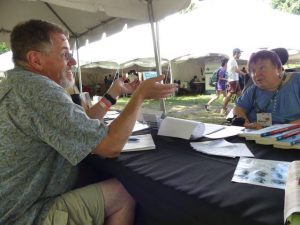 Christine led a workshop on creative spiritual practices and how to break out of stale routines that often limit our imagination and ability to hear God in the everyday of life. Meanwhile, I met many creative souls at the MSA book table, reconnected with many old friends and made several new ones.
Christine led a workshop on creative spiritual practices and how to break out of stale routines that often limit our imagination and ability to hear God in the everyday of life. Meanwhile, I met many creative souls at the MSA book table, reconnected with many old friends and made several new ones.
Godspace Community Blog
Have you noticed we’re now referring to the Godspace blog as the “Godspace Community Blog”? We’ve passed the 50-writers mark, with contributors coming from seven different countries… and counting. Our goal is to make this a truly community blog, one that you help shape and one that helps to form connections between our writers, artists, and readers. We’re always looking for more writers, poets, and other artists to feature. Please contact us if you’re interested in joining this diverse group of Christ-followers.
We’re now half-way through our July blog theme, “Listening with the Celtic Saints”. We’ve had some great contributions along the way including:
- Greg Valerio’s, “Discovering the Rule of St. Columba”
- Rebecca Baxter’s, “Listen to the Wind Words”
- Rodney Newman’s, “Radical Hopitality – the Way of the Celts”, this month’s Featured Author,
- Keren Dibbens-Wyatt’s, “The Heart of Listening” and,
- Lynne Baabs, “Celtic Saints Help Us to Learn to Listen to Creation”, with beautiful artwork by her husband, David Baab
Our theme in August is “Listening to/through the Life of Jesus”, and in September we’ll tackle “Adventures in Prayer”. Please join us in exploring all these themes through writing, photography, painting, poetry, song, or whatever your creative expression is that we can share through our website. Contact us and let us know how you’d like to participate, or just to find out more.
Each month we plan to publish a resource list connected to that month’s theme. You can find this month’s Celtic Resource List HERE.
These lists couldn’t happen without your suggestions. While we can’t always fit every suggested resource onto the list, we rely on your ideas, suggestions, and recommendations to make these resources as complete and diverse as possible. Share your ideas of must-haves for our upcoming themes:
Listening to/through the Life of Jesus
Adventures in Prayer
An Appeal
Transitions cost money. There’s no easy way around it and no pretty way to say it. At MSA//Godspace we work hard to make sure every dollar is well spent and not wasted, but the truth of the matter is that your support is critical to the ongoing ministry of this unique community. So let me keep this short and to the point: Please take a moment now to send in your financial contribution to continue to make this work possible. You can GIVE ONLINE or mail a check to Mustard Seed Associates, PO Box 45867, Seattle, WA 98145.
If your employer contributes matching donations, MSA might be included in their list of eligible organizations. Please check with your human resources department to find out if we qualify. MSA is silver-rated through Guide Star and also participates in Benevity’s Causes Portal which makes employer-matched donations easy.
If you shop through Amazon you can also choose us as your supported non-profit. Amazon donates a small portion of each purchase to us – a win-win! Click HERE to find out more.
Have more questions about giving to MSA/Godspace? Please check out our online donation FAQ.
Supporting Prayer
Please continue to hold us in prayer through our transitions at MSA/Godspace. On August first Christine will officially step down as Director of Mustard Seed Associates and I will step into her role. Thus far the transition has been smooth, and we look forward to a continued gentle ride into the future. Specifically, please pray:
- For Christine and Tom as they shift their roles within the organization. We are so glad they will continue to participate, and we pray these changes will free them up for even greater things.
- For our new board, which is directing this transition and helping us to reimagine MSA/Godspace and the Center for Imagination and Creativity.
- For me, as I take on administrative tasks while increasing my writing and speaking opportunities.
- For discernment as to how I might most effectively hand off web design, maintenance, and other ongoing Internet-related forms of communication.
Thank you for joining together with us in cultivating imagination, creating spaces to learn and grow, and discovering new ways to collaborate for a more faith-filled and vibrant future.
Shalom,
Andy Wade
Co-Director
Mustard Seed Associates // Godspace
As an Amazon Associate, I receive a small amount for purchases made through appropriate links.
Thank you for supporting Godspace in this way.
When referencing or quoting Godspace Light, please be sure to include the Author (Christine Sine unless otherwise noted), the Title of the article or resource, the Source link where appropriate, and ©Godspacelight.com. Thank you!

